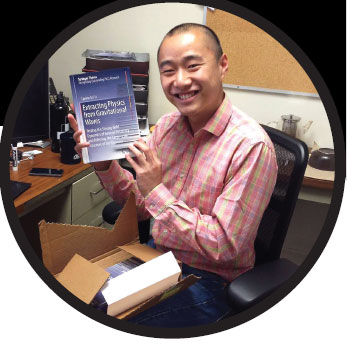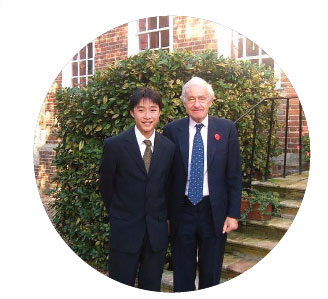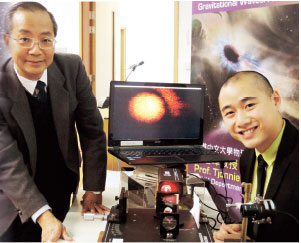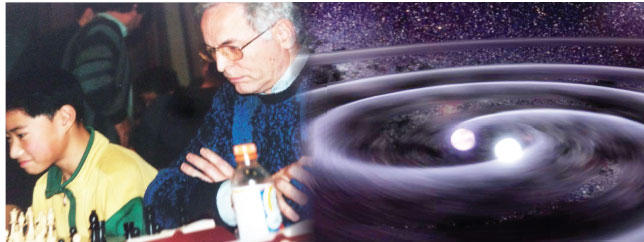A HK scientist's odyssey into space and time
Updated: 2016-02-24 08:06
By Wang Yuke(HK Edition)
|
|||||||
HK-born scientist Tjonnie Li played an important part in deciphering radio signals that led to the landmark discovery of gravitational waves. Wang Yuke reports.
'The universe is big dens of stars, black holes and other fascinating objects that are constantly dancing around each other, and sometimes bumping into each other," remarks Tjonnie Li, the only Hong Kong scientist to take part in the ground breaking research that detected gravitational waves for the first time.
It was the study of two gigantic objects a billion light years from earth, bumping into each other that led to the long awaited detection of gravitational waves predicted a century earlier by Einstein's Theory of General Relativity.
The discovery by the Laser Interferometer Gravitational-Wave Observatory (LIGO) was announced on Feb 11. Li contributed his expertise in signal data analysis that provided the most solid evidence for scientists to observe and identify gravitational waves.
The discovery of gravitational waves means science will have the ability to observe events in deep space invisible to modern telescopes. There is hope the study of gravitational waves will allow science to trace the history of the universe all the way back to Big Bang, nearly 14 billion years ago.
Scientists had been carefully observing the two distant black holes, anticipating that their impending collision would generate a cataclysm of observable gravitational waves. The waves were first picked up by twin detectors of the LIGO on Sept 14 last year at 5:51 am sharp.
The discovery shook the world, not only as an astronomical first that marks a giant leap for theoretical physics, but also a revolution in the way we perceive and understand space, time and the universe, says Li. The discovery offers further evidence of Einstein's theory that massive objects exerting gravity bend space and alter time.
Young face in LIGO
Li was born in Hong Kong. Soon after, his family immigrated to the Netherlands. He spent his undergraduate and postgraduate years at the University of Cambridge, studying Experimental and Theoretical Physics. He took postdoctoral studies at the California Institute of Technology. He joined LIGO in 2009, at the age of 23, focusing on gravitational waves detection.
From the time gravitational waves were first detected, scientists needed to analyze the signals from deep space. It proved difficult. The detectors were subject to radio frequency and electromagnetic interference from other sources, said Li, research assistant professor from the Department of Physics, Chinese University of Hong Kong (CUHK). Interference could come from a passing train, a person walking past the detectors or even the laser inside the detectors. Li's job was to differentiate between actual signals from the colliding black holes and atmospheric "noise".
LIGO sought different approaches to improve its detectors' capability to filter out external interference.
Li's student, Lau Ka-tung, took part in the research at the LIGO over the summer of 2015. Lau said his job was to implement a machine learning mechanism to distinguish between probable gravitational waves from other signal interference. "We prepared some training data so that a computer could learn to distinguish real signals and false alarms."
Li adds that two teams of scientists carried out the analysis, working independently. "The two teams did not exchange findings. If both teams working independently obtained the same results through analysis, coincidently, we could draw a conclusion with confidence."
Gravitational waves are ripples in the fabric of Space-Time, at the speed of light. Einstein had predicted gravitational waves from extreme cosmic events such as collision of two black holes. After the violent collision of two black holes orbiting around each other, their energy would become depleted by emission of gravitational waves. Over billions of years, the waves would disperse, eventually becoming detectable by sensors on earth.
LIGO scientists estimated, the collision of black holes, which caused the gravitational waves they observed this time, took place 1.3 billion years ago.
The fact that the gravitational waves get weaker and weaker over time, like ripples on a pond, posed another engineering challenge for constructing detectors. By the time gravitational waves reach the earth, their energy is reduced to a tiny fraction of their original magnitude. That makes it tricky for scientists to capture and measure the signal. Li said over the past 30 years, since LIGO developed its first detector prototype, LIGO has made continuous efforts refining its detectors and eventually developed the most highly sensitive twin detectors.
Although the existence of gravitational waves had not been observed until last year, the first indications that Einstein's theory was right came as early as 1982. American scientists Joseph Taylor and Joel Weisberg found that as a pair of black holes orbiting around each other released energy in the form of gravitational waves, as their colliding orbits grew smaller and smaller. As a result, the two black holes approached one another gradually but accelerated rapidly in the final stages. Eventually the two merged into a single massive black hole, converting a portion of the combined black hole's mass into energy which refers to the "E" in the famous Einstein's formula - E=mc. This energy is emitted as the last strong burst of gravitational waves fractionally less than the speed of light.
Make impossible possible
Gravitational waves, which seem like products of science fiction, now appear ready to make what once seemed impossible possible in everyday life. Li says the discovery of gravitational waves offers the most compelling testament to Einstein's Theory of Gravity, and his theory has an enormous impact on everyday life.
GPS systems that have become ubiquitous are based on the Theory of Gravity. Not only the space but also time is warped by the effect of gravity, said Li. A clock on the surface of the Earth runs at a different rate than a clock aboard a space satellite because the bending of space high above the earth is substantially reduced. Thanks to GPS which in essence works from satellites sending time signals, we always know our exact location and distance from one point to another, said Li.
Li's PhD student, Wang Yifan, was pretty sure that our life will benefit from gravitational waves in the future. "Compared with electromagnetic waves, the energy of gravitational waves is less likely to be dissipated. For this reason, gravitational waves could be more suitable and effective for long distance communication."
Professor Li is guiding Wang on a project focusing on the background of random gravitational waves caused by the overlapping of binary neutron stars, cousins of black holes. Background data of gravitational waves could shed light on the mechanism that creates binary neutron stars and ultimately gives humanity a clearer picture of the universe's evolution.
Eager to travel into space to admire the infinite starscapes of the universe since he was a child, Li expects the landmark discovery of gravitational waves could bring humans closer to space travel. "Since we have already confirmed the existence of gravitational waves, space and time travel is scientifically and theoretically possible."
Li says his childhood dream was to be an astronaut but he gave it up because he was prone to car sickness. A library regular, Li spent most of his childhood immersed in science books about stars, the universe and planets. "I was mesmerized by the fantastic pictures of galaxies and marveled at facts of the universe described in books." He remembers asking loads of questions but most of time got no answers because his parents did not have much education. On the first day he came back to Hong Kong for a short visit, he begged his mom to take him to the Space Museum.
He was obsessed with documentary films featuring the universe. Even today he loves to watch movies, not for learning about the universe but for the excitement of viewing places a billion light years distant.
He buys into plots and scenes from the movie Interstellar, where a group of explorers make use of a newly discovered wormhole to transcend the limitations on human space travel and conquer the vast distances involved in interstellar voyages. He put his faith in the old saying, "nothing is impossible".
"Even though people cannot find practical use for gravitational waves for the time being, I'm sure in the long term, it will have a far-reaching impact on the whole society one way or another. Just like when laser was first discovered, we couldn't find its immediate applications."
Contact the writer at jenny@chinadailyhk.com

|
Tjonnie Li was awarded the Stefano Braccini Prize for the international best thesis in gravitational-wave physics in 2013. Provided to China Daily |
|
Richard Wilson (right), governor of HK from 1987 to 1992, was the master of the Cambridge College where Li studied. |
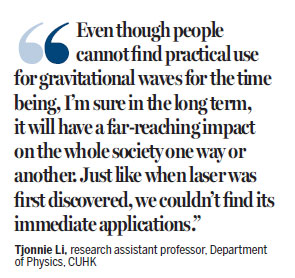
|
|
|
|
(HK Edition 02/24/2016 page11)
